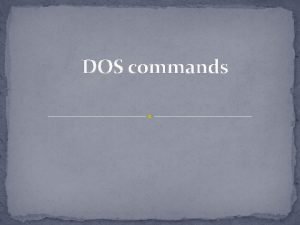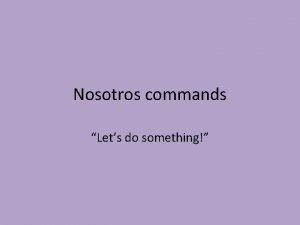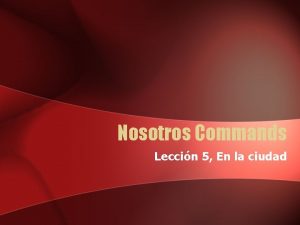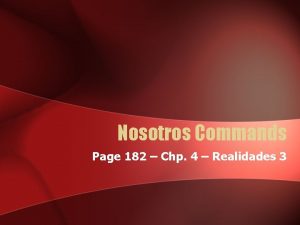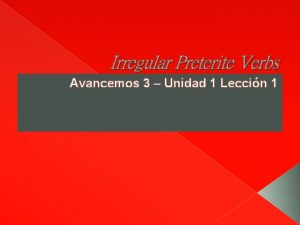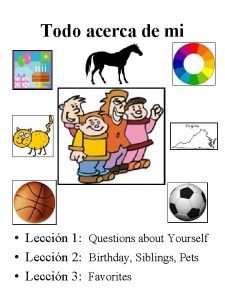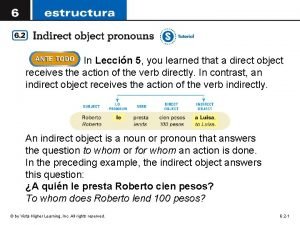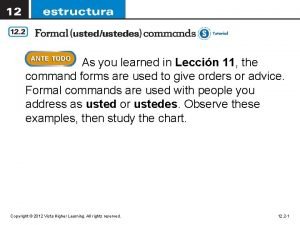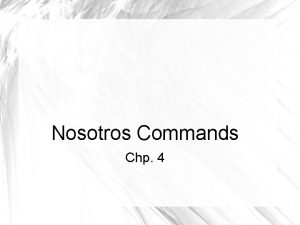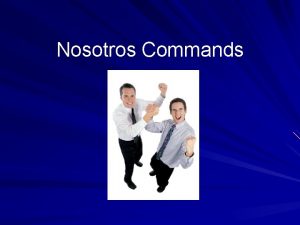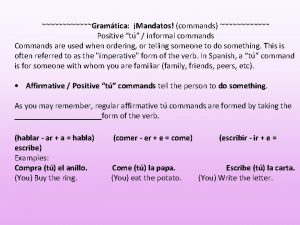Nosotros Commands Leccin 5 En la ciudad Nosotros










- Slides: 10

Nosotros Commands Lección 5, En la ciudad

Nosotros Commands • Nosotros commands are used to give orders or suggestions that include yourself and other people. • There are two ways to suggest that others do some activity with you. . . • You can use the construction Vamos a + infinitive. • Vamos a hacer las paces. • Let´s make up. • Remember, however, that vamos a + [infinitive] can also mean we are going to (do something). Context and tone of voice determine which meaning is being expressed.

• To express Let’s go, the present indicative form of ir (vamos) is used, not the subjunctive. For the negative command, however, the subjunctive is used (vayamos).

Nosotros Commands • The nosotros command (for both affirmative and negative) is the same as the nosotros form of the present subjunctive. • Resolvamos el conflicto. • Let’s resolve the conflict. • No reaccionemos tan rápido. • Let’s not react so quickly.

Nosotros Commands • Remember that stem-changing verbs whose infinitive ends in –ir have a stem change of e>i, or o>u in the nosotros form. • Pidamos perdón por el malentendido. • Let´s ask forgivenes for the misunderstanding. • No durmamos en la clase de la Srta. Gallegos. • Let´s not sleep in Srta. Gallegos’s class.

Nosotros Commands • Verbs whose infinitive ends in –car, -gar, and –zar have a spelling change in the nosotros form of the present subjunctive, and consequently in the nosotros command as well. • No critiquemos a nuestros amigos. • Let’s not criticize our amigos. • Empecemos a pensar un poco en ellos. • Let’s begin to think a little about them.

Nosotros Commands • Direct and indirect object pronouns are attached at the end of affirmative nosotros commands and a written accent is added to maintain the original stress. Object pronouns are placed in front of negative nosotros/as commands.

• Celebremos tu cumpleaños. Celebrémoslo. • Let´s celebrate your birthday. Let´s celebrate it. • Digámosle todo. No le mintamos. • Let´s tell him everything. Let’s not lie to him.

Nosotros Commands • When attaching reflexive or reciprocal pronouns at the end of an affirmative nosotros command, drop the final –s of the command before the pronoun. • ¡Alegrémonos con sus éxitos! • Let´s be happy about their success! >>> No se puede decir “alegrémosnos” • Atrevámonos a darles nuestras opiniones. • Let´s dare to give them our opinions. >>> No se puede decir “atrevémosnos” • The nosotros/as command form of irse (to go away) is vámonos. Its negative form is no nos vayamos.

Indica los mandatos afirmativos y negativos de la primera persona del plural (nosotros/as) de estos verbos. 1. estudiemos, no estudiemos 5. decir _____ estudiar ______ 6. cerrar _____ 2. cenar _____ 7. levantarse _____ 3. leer _____ 8. irse _____ 4. decidir _____
